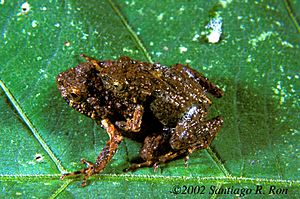Colorado dwarf frog facts for kids
Quick facts for kids Colorado dwarf frog |
|
|---|---|
 |
|
| Conservation status | |
| Scientific classification |
|
| Kingdom: | Animalia |
| Phylum: | Chordata |
| Class: | Amphibia |
| Order: | Anura |
| Family: | Leptodactylidae |
| Genus: | Engystomops |
| Species: |
E. coloradorum
|
| Binomial name | |
| Engystomops coloradorum (Cannatella and Duellman, 1984)
|
|
| Script error: The function "autoWithCaption" does not exist. | |
| Synonyms | |
|
Physalaemus coloradorum Cannatella and Duellman, 1984 |
|
Script error: No such module "Check for conflicting parameters".
The Engystomops coloradorum, also known as the Colorado dwarf frog, is a type of frog that belongs to the Leptodactylidae family. This means it's part of a group of frogs often called "southern frogs." This special frog is found only in a specific area of Ecuador. It lives in the lowlands and foothills of the Andes mountains, specifically in the Pichincha and Santo Domingo de los Tsáchilas Provinces.
What Does It Look Like?
Male Colorado dwarf frogs are quite small, measuring about 18 to 24 millimeters (less than an inch) from their snout to their rear end. Females are a bit larger, usually 22 to 26 millimeters long.
This frog has a pointed snout. Its eardrum, called a tympanum, is small and sits a bit sunken into its head. The ring around its eardrum feels bumpy. Its front legs are thin, and its fingers do not have any webbing between them. The back legs are short, and its toes have a little bit of webbing at their base.
The frog's back is covered in small bumps, and it has larger bumps on its head and body. Its back is usually brown, and sometimes it has an orange-brown stripe running down the middle. Its legs are orange-brown, with dark brown marks on the front legs and dark brown to black stripes on the back legs. The belly of the frog is black with many white or bluish-white spots. These spots turn dark brown on its sides and back legs. The frog's eyes are a light grayish-brown or dull bronze color, with tiny black lines.
Where It Lives and How It's Protected
The Colorado dwarf frog lives in warm, wet forests. It can also be found in areas that have been changed by people. These frogs live at elevations from about 100 to 1100 meters (about 330 to 3600 feet) above sea level.
When it's time to lay eggs, this frog builds foam nests in small, calm pools of water. Even though its home range is small, you can find many of these frogs in certain spots. The Colorado dwarf frog can adapt to some changes in its environment. However, it is likely threatened by the loss of its natural forest home.
See also

 | Audre Lorde |
 | John Berry Meachum |
 | Ferdinand Lee Barnett |


